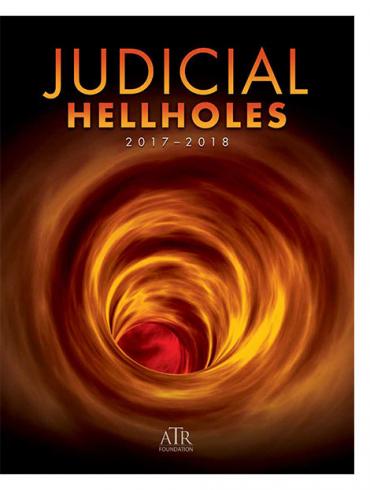
As bad as Florida's reputation has been over the last decade and a half as a lawsuit-happy state, a new report says we've "risen" to a new low: "Enough shade has been cast on the Sunshine State to rank it as the nation's worst Judicial Hellhole," says the American Tort Reform Association (ATRA) in its latest report.
The Florida Supreme Court, all on its own, was ranked fourth in ATR reports for the past two years -- for the torrent of liability-expanding decisions it issued, many over vigorous dissents.
But for 2017-2018, we're No. 1 overall for the first time in the 16 years ATRA has been ranking lawsuit abuse. Read the executive summary and full report here.
The ranking comes a day after the 5th District Court of Appeal upheld a decision by the state Office of Insurance Regulation to reject restrictions proposed by Security First Insurance Co. The ruling was a blow to the Florida insurance industry, which blames trial-lawyer favorite "assignment of benefits" for driving up property-insurance premiums. The industry so far has been unable to persuade a lawyer-heavy Legislature to make changes to the longstanding practice.
The Florida Chamber of Commerce calls ATRA's latest ranking announced this morning further evidence that Florida’s legal climate is among the worst in America.
“Lawsuit abuse in Florida is an increasingly serious and expensive problem, and it just keeps getting worse. On average, it translates into a $3,400 ‘tax’ for Florida’s families each year, due to increased lawsuit abuse costs,” said Mark Wilson, president and CEO of the Florida Chamber.
“There have been five Wall Street Journal articles this year alone talking about Florida’s horrendous lawsuit abuse, the national Institute for Legal Reform named Florida the fifth worst state for legal climate, and now the American Tort Reform Association ranks Florida as the worst Judicial Hellhole," Wilson continued. "How much more evidence do lawmakers need to take action?”
Here are some of the highlights from the executive summary of this 2017-2018 Judicial Hellholes report:
 -- The report shines its brightest spotlight on eight jurisdictions or courts that have earned reputations as Judicial Hellholes, including Florida, California, St. Louis, New York City, Philadelphia, New Jersey, Madison and Cook Counties, Illinois, and Louisiana.
-- The report shines its brightest spotlight on eight jurisdictions or courts that have earned reputations as Judicial Hellholes, including Florida, California, St. Louis, New York City, Philadelphia, New Jersey, Madison and Cook Counties, Illinois, and Louisiana.
-- The Florida Supreme Court’s liability-expanding decisions and barely contained contempt for the lawmaking authority of legislators and the governor has repeatedly led to its inclusion in this report. And though the high court’s plaintiff-friendly majority this year shrunk from 5-2 to 4-3, a hushed discussion between two majority justices recently caught by an open microphone suggests that this majority is as partisan as ever and brazenly determined to influence the judicial selection process as three like-minded colleagues face mandatory retirement in early 2019.
-- Meanwhile, an aggressive personal injury bar’s fraudulent and abusive practices in South Florida and elsewhere have also tarnished the state’s reputation. Encouragingly, at least some plaintiffs’ lawyers who’ve crossed the line are being held accountable, either with stiff court sanctions or criminal prosecutions. But with the help of some lawmakers, too many are still getting away with too much, and for the first time in this report’s 16-year history, enough shade has been cast on the Sunshine State to rank it as the nation’s worst Judicial Hellhole.
“At a time when we’re trying to lower the cost of living on Florida families, this isn’t good news for home and auto owners and their insurance rates. At a time when we’re trying to lower the cost of doing business in Florida, including reducing workers’ comp rates, this isn’t good news,” Wilson said.
The report’s “Dishonorable Mentions” include singularly unsound decisions by Connecticut’s high court and a Wisconsin appellate court, as well as three tort reform vetoes by Minnesota’s Gov. Mark Dayton, “a plaintiffs’ bar puppet.”
But the report’s 'Points of Light' section this year spotlights the good news, actions taken by attorneys general in Arizona, New Mexico and Nevada, cracking down on often fraudulent disability-access lawsuits that target small businesses. Several sound state and federal court decisions and verdicts are also applauded, as are 17 positive tort reforms enacted in 13 states in 2017.
“Finally, this year’s three ‘Closer Looks’ examine the U.S. Supreme Court’s jurisdictional decisions in 2017 and their likely impact on forum-shopping, as well as trial lawyers’ growing influence on fast-spreading opioid litigation and the long-respected but suddenly changing American Law Institute,” concluded ATRA President Tiger Joyce.
The Washington, D.C.-based American Tort Reform Association is the only national organization that concentrates exclusively on tort and liability reform through public education and the enactment of legislation.
Reach Nancy Smith at nsmith@sunshinestatenews.com or at 228-282-2423. Twitter: @NancyLBSmith


